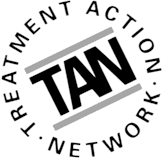
Treatment Action Network Update
July 13, 2000
 |
Treatment Action Network Update July 13, 2000 |
|
Ryan White CARE Act Reauthorization As reported in the last TAN Alert, the Senate recently voted unanimously in favor of Senate Bill 2311 (Kennedy/Jeffords), which would reauthorize the Ryan White CARE Act. The CARE Act is due to expire on September 20, 2000. This bill was strongly supported by advocates and had 50 Senate cosponsors by the time it was passed In early July, the House of Representatives' version, H.R. 4807, was introduced. This bill is authored by Representatives Tom Coburn (R-OK) and Henry Waxman (D-CA). On Tuesday of this week, the House Commerce Subcommittee on Health and Environment held a hearing on the bill and heard public testimony. Today, the House Commerce Committee voted unanimously in support of this legislation. Next, the entire House of Representatives will vote on the legislation (most likely at the end of the month before Congress takes its August recess). Then, a joint House/Senate "conference committee" will convene (likely in September) to work out differences between the two versions. After that, the entire House and Senate will vote again on the final product and send it to the President. Project Inform believes that the Ryan White CARE Act should be reauthorized this year to avoid any interruptions in the critical care and treatment services it provides. We also strongly support the Senate version as it leaves much of the current bill language intact. It also includes some improvements, such as the development of minimum standards to ensure high quality care for all CARE act recipients.
However, we are concerned about language in the proposed House version (H.R. 4807) regarding HIV testing of pregnant women and newborns. Currently, the CARE Act allows $10 million to be distributed to states for programs intended to reduce perinatal transmission of HIV. These programs could include counseling, voluntary testing, outreach and treatment services for pregnant women with HIV, and to help pay for mandatory newborn testing programs. The proposed House bill would add another $20 million for this purpose. However, of that $20 million, a gradually increasing proportion must be set aside for states that have either mandatory testing requirements for either all newborns or newborns whose mother's HIV status is unknown. Currently, only New York and Connecticut have such laws. This set-aside starts at 25% in the first year of the bill and rises to 75% by the fourth year. In other words, while the legislation does not require states to adopt mandatory testing programs, it provides financial incentives for them to do so. Project Inform opposes mandatory HIV testing of any individual. We strongly support voluntary HIV testing with appropriate counseling, and we support funding for non-coercive programs that improve the care and treatment of HIV positive pregnant women and that reduce perinatal transmission. There is no evidence that mandatory testing will help achieve these goals. Instead, it could discourage pregnant women from accessing the healthcare system. (For more information about this issue, and Project Inform's position, please e-mail tan@projectinform.org for a copy of our upcoming article in the PI Perspective on HIV testing of pregnant women and newborns). The language in the House bill is a carefully negotiated compromise between Representatives Coburn (a longtime advocate of mandatory testing of pregnant women and newborns), Waxman and Greenwood (R-PA), and some advocates. We recognize the political context in which this agreement was reached and we appreciate the willingness among the three Members of Congress to work out a compromise. However, we oppose any language that provides incentives or any other form of leverage to states to get them to adopt mandatory testing programs. We hope that our concerns will be addressed when the joint House/Senate conference committee meets to work out differences between the two bills. It is essential for the CARE Act to be reauthorized this year, but the final product must be one that has strong community support. Please look for future TAN Alerts as this issue moves forward. Your voice will be essential to ensure that this lifesaving legislation is renewed in a way that improves the lives for all people living with HIV/AIDS. For more information, contact:
Ryan Clary Project Inform 205-13th Street #2001 |